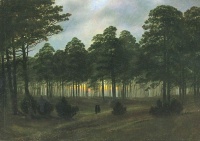Natural environment
From The Art and Popular Culture Encyclopedia
_-_Seurat.jpg)
|
"Green politics generally favor tariffs on fossil fuels, restricting genetically modified organisms, and protection of the natural environment." --Sholem Stein |
|
Related e |
|
Featured: |
The natural environment, commonly referred to simply as the environment, is a terminology that comprises all living and non-living things that occur naturally on Earth or some region thereof. This term includes a few key components:
- Complete ecological units that function as natural systems without massive human intervention, including all vegetation, animals, microorganisms, rocks, atmosphere and natural phenomena that occur within their boundaries.
- Universal natural resources and physical phenomena that lack clear-cut boundaries, such as air, water, and climate, as well as energy, radiation, electric charge, and magnetism, not originating from human activity.
The natural environment is contrasted with the built environment, which comprises the areas and components that are strongly influenced by man. A geographical area is regarded as a natural environment (with an indefinite article), if the human impact on it is kept under a certain limited level (similar to section 1 above). This level depends on the specific context, and changes in different areas and contexts. The term wilderness, on the other hand, refers to areas without human intervention.
See also
- Biodiversity
- Built environment
- Conservation Movement
- Earth Science
- Biophysical environment
- Ecology
- Ecosystem
- Environmentalism
- Gaia hypothesis
- List of environmental issues
- List of environment topics
- List of environmental websites
- Megaproject
- Nature
- Natural capital
- Natural history
- Natural resource
- Natural landscape
- Sustainability
- Sustainable agriculture
- Timeline of environmental events
- Wilderness
- Wildlife



